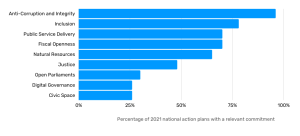Introduction
The Open Government Partnership (OGP) provides an opportunity for government and civil society reformers to make governments more transparent, participatory, and accountable. Working together, government and civil society co-create action plans with concrete commitments across a variety of sectors.
This page summarizes findings – by policy area or approach – from the 23 action plans submitted by OGP participating countries during the 2021 submission period. (See What’s in the 2021 Local Action Plans for an analysis of popular policy areas at the local level.) Not all 2021 action plans have been reviewed by OGP’s Independent Reporting Mechanism, meaning references to these commitments should not be viewed as an evaluation of their quality or ambition.
In this Analysis
|
Featured Policy Areas and Approaches
Cross-Cutting Areas
About the DataDownload this publication as a PDF here. |
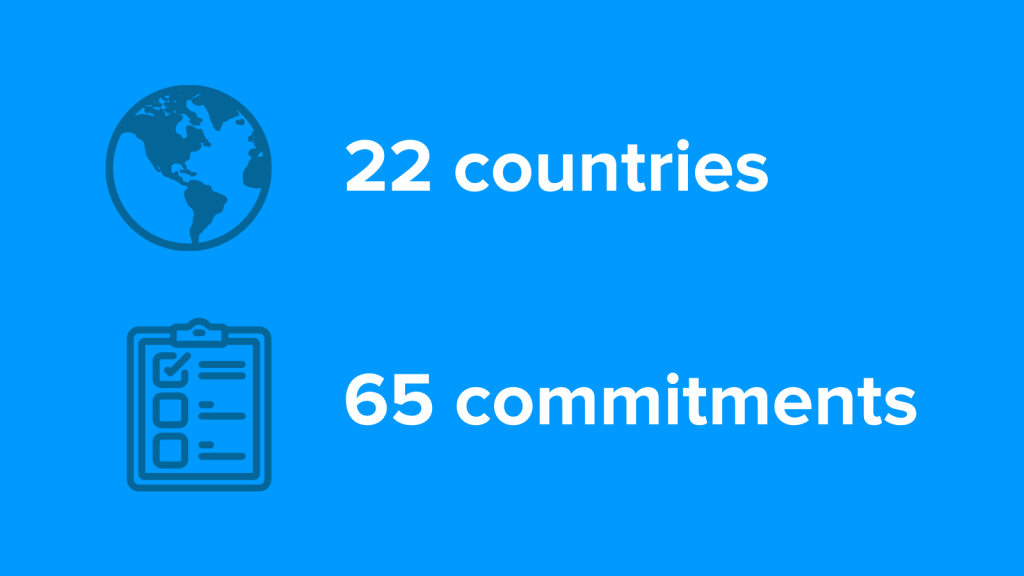
Anti-Corruption and Integrity
Everyone should be able to observe, inform, and influence decision-making equally. Systems should exist to ensure that public officials do not use their offices for private gain. The role of money in politics should be transparent and include citizen-facing channels for accountability. Twenty-two of the 23 countries included an anti-corruption and integrity commitment in their 2021 action plans.1 Most of the commitments are related to public procurement and open contracting, right to information laws, political integrity, or beneficial ownership transparency.2
Public Procurement and Open Contracting
Open contracting processes increase competition, improve the quality of public services, and ensure governments better value for their money. Commitments in this area tend to focus on publishing high-quality procurement data and creating citizen monitoring mechanisms. In 2021, 13 countries made commitments related to public procurement. Of these, 11 commitments reference open contracting principles. Factoring in last year’s action plans, over half of OGP countries with an active action plan are currently implementing a commitment related to public procurement.
Right to Information
The right to access government information enables the public to participate meaningfully in official decision-making and to hold government actors accountable for their decisions. Right to information commitments tend to focus on the use of online platforms to submit and service information requests, management of government records, and the publication of responses to information requests. Eleven countries with a 2021 action plan made a commitment related to right to information laws. Consistent with recent years, half of OGP countries with an active action plan are currently implementing a commitment in this area.
Political Integrity
Political integrity reforms – defined here as asset disclosure, elections and political finance, and/or lobbying reforms – are critical to ensuring that public officials represent the interests of the public and do not use their office for personal gain. Ten countries included a political integrity commitment in their 2021 action plans. Commitments in this area tend to focus on legal reform or the collection and publication of political integrity data.
Beneficial Ownership Transparency
Disclosing beneficial owners — those who ultimately control or profit from a business — has emerged as an important tool to fight corruption, particularly the misuse of shell companies. Beneficial ownership transparency has been a growing area of reform among OGP countries, especially in Europe. Two countries – Italy and Lithuania – made their first OGP commitment to beneficial ownership transparency in 2021, while five other countries made a follow-up commitment in the area.
Commitment Examples
- Germany, Italy, Panama, and the United Kingdom are publishing procurement data according to the Open Contracting Data Standard.
- Jamaica, Mongolia, and Senegal are working on right to information legislation, while Ghana and Morocco are implementing right to information laws.
- Senegal is strengthening legislation to improve compliance with asset disclosure requirements, while Ireland and France are implementing lobbying-related reforms.
- Lithuania is creating a public beneficial ownership register, while North Macedonia and Portugal are establishing links between beneficial ownership and public procurement data.
1. The OGP Support Unit defines anti-corruption and integrity commitments as those that are relevant to anti-corruption institutions, asset disclosure, audits, beneficial ownership, conflicts of interest, elections and political finance, lobbying, open contracting, public procurement, right to information, or whistleblower protections.
2. The OGP Support Unit defines political integrity reforms as those that involve asset disclosure, elections and political finance, and lobbying.
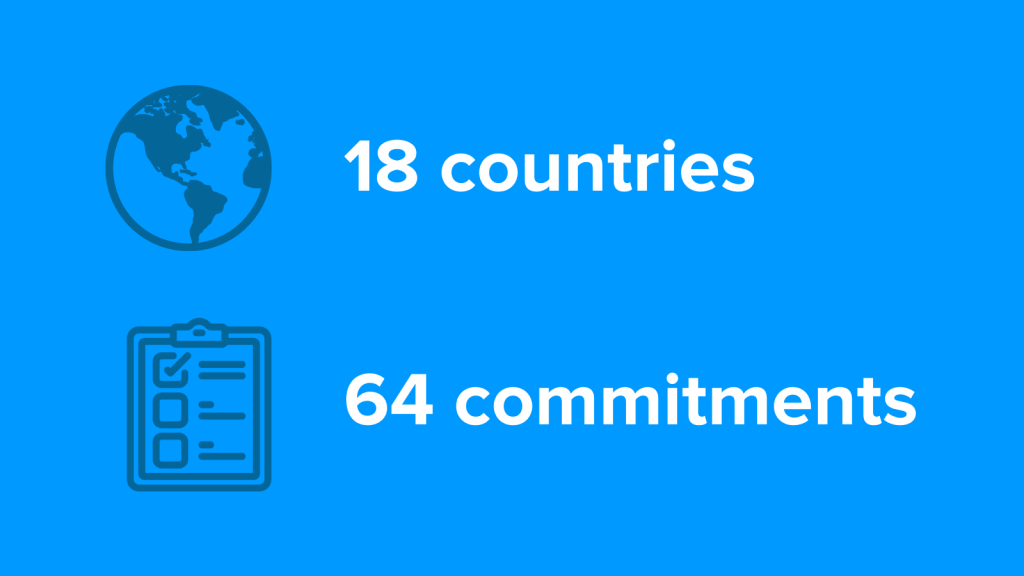
Inclusion
To be truly open, goverments must serve all people, including women, those across the gender and sexual identity spectrum, indigenous and disability communities, among others. In recent years, more countries have incorporated elements of inclusion in their action plans. Over three-quarters of countries with an active action plan are currently implementing an inclusion-related commitment. Many inclusion commitments in 2021 action plans address people with disabilities, gender, and youth.
People with Disabilities
A government is not open unless it is accessible to all, and many OGP countries are working to ensure people with disabilities are afforded equitable services and opportunities to participate. Thirteen countries made commitments referencing people with disabilities through their 2021 action plans. Nearly half of OGP countries with an active action plan are currently implementing a disabilities-related commitment – the highest-ever percentage.
Youth
Recognizing that investing in youth means investing in a better future, OGP countries are creating meaningful opportunities for youth to participate in government processes. In 2021, 12 countries made youth-related commitments. Commitments involving services and participatory opportunities for youth have grown in popularity among OGP countries in recent years. Over half of OGP countries with an active action plan are currently implementing a youth-related commitment.
Gender
Gender-related commitments tend to focus on ensuring diversity in participatory processes and targeting gender gaps in policies that systematically exclude gender groups like women, non-binary individuals, and members of the LGBTQIA+ community. Twelve countries made gender-related commitments in 2021. For the first time since OGP was established in 2011, over half of OGP countries with an active action plan are currently implementing a gender-related commitment.
Commitment Examples
- Guatemala is preparing their disability-related policies for alignment with international conventions, and Latvia is making government information and language more accessible.
- Jamaica and Tunisia are increasing youth participation in government decision-making.
- Jordan is adopting a gender mainstreaming policy, while Morocco is strengthening women’s participation in governance and the economy.
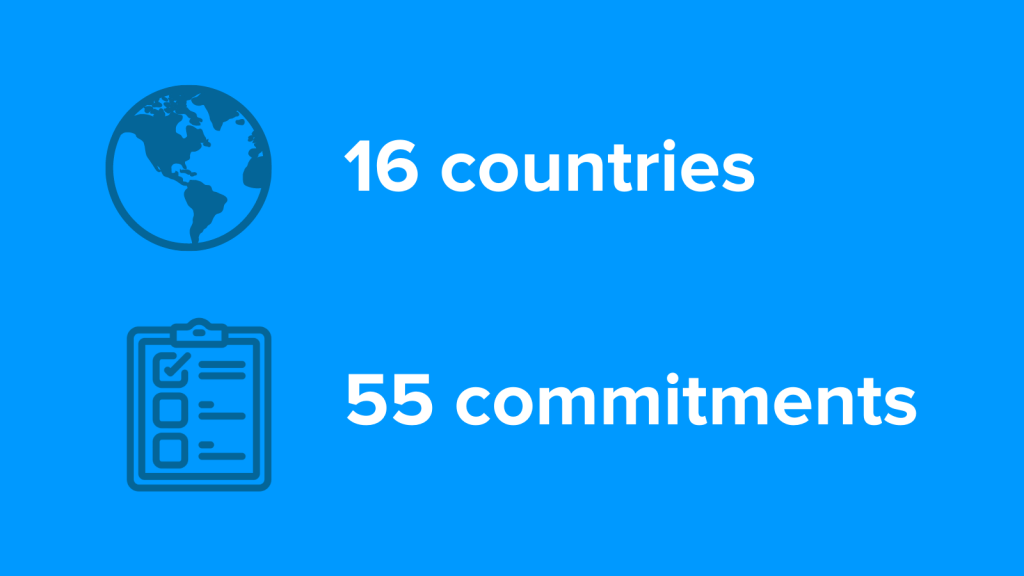
Public Service Delivery
Improving the quality of and access to public services helps ensure that citizens of all groups are better supported by their government. Nearly three-quarters of OGP countries with an active action plan are currently implementing a public service delivery commitment. Many of these commitments focus on education and health, but may also address services related to immigration, infrastructure and transport, economic safety nets, or digital inclusion.
Education
Public accountability within the education system is key to improving outcomes and attainment, but accountability is nearly impossible to achieve without transparent policies and opportunities for participation in decision-making. Commitments in this area typically involve opening education-related data, improving monitoring of budgets and resources, and increasing access to education. Twelve countries made a commitment related to education in their 2021 action plans.
Health and Nutrition
Publishing health-related data and involving citizens in the creation of policy are key to increasing health outcomes and building strong, effective health systems. In OGP, health-related commitments tend to focus on citizen policy-making, budget monitoring, and open data platforms. In 2021, 11 countries included a health-related commitment as part of their action plan. Now, just under half of OGP countries with an active action plan are currently implementing a health-related commitment.
Commitment Examples
- Guatemala is opening education and health-related data, along with hosting dialogues as part of their Great National Crusade for Nutrition.
- Morocco is proactively publishing data related to the education and health sectors.
- North Macedonia is establishing systems for citizen involvement in education and health policy.
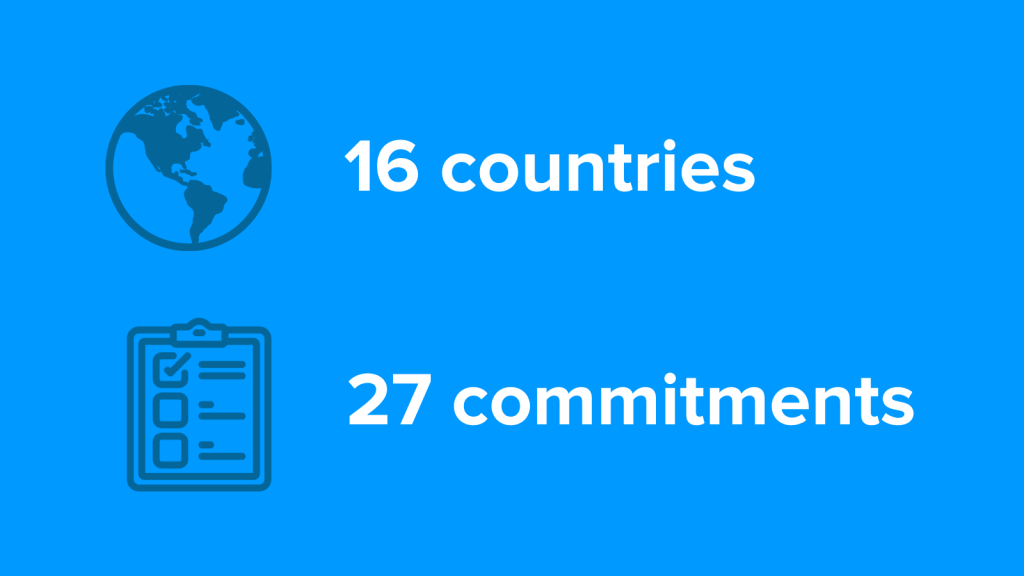
Fiscal Openness
Citizens deserve to know and have a voice in how their government is getting money, what is being prioritized for spending, and whether the money is being used effectively. Fiscal openness has consistently been one of the most popular areas for open government reforms across all regions. Nearly three-quarters of OGP countries with an active action plan are currently implementing a fiscal openness commitment.
Fiscal Transparency
Fiscal transparency enables civil society organizations, journalists, and interested citizens to monitor government spending. In 2021, 12 countries made commitments related to fiscal transparency. Many of these commitments, particularly in Europe, involve the transparency of national post-pandemic recovery plans. Just under two-thirds of countries with active action plans are currently implementing a fiscal transparency commitment.
Participatory Budgeting
Participatory budgeting gives citizens the opportunity to control where a portion of government funds are spent, based on their priorities. Eight countries committed to participatory budgeting in their 2021 action plans. Factoring in last year’s action plans, one-third of OGP countries with an active action plan are currently implementing a participatory budgeting commitment.
Commitment Examples
- France, Italy, Latvia, and Portugal are building transparency into their National Recovery and Resilience Plans, which detail national spending of the European Union’s Recovery and Resilience Facility, and are providing opportunities for citizen participation.
- Mongolia and Panama are ensuring greater transparency during the budget cycle.
- The Republic of Korea is expanding participatory budgeting at both the national and local levels, while Senegal is promoting opportunities for local participatory budgeting.
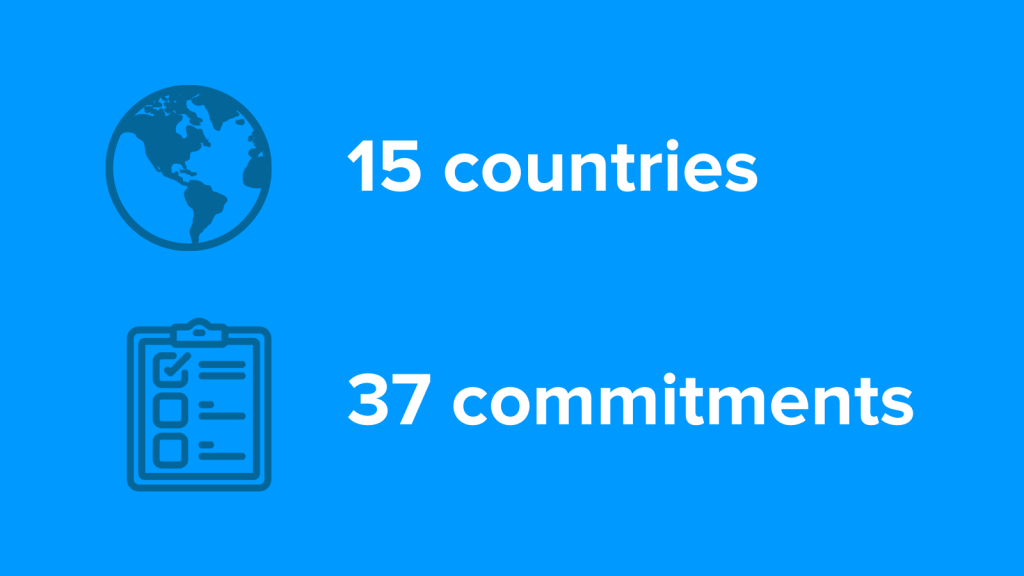
Natural Resources
The inclusion of community voices in natural resource governance – including in the areas of extractive industries, environment and climate, and land reform – can help detect corruption, safeguard community interests, and support environmental sustainability. Most natural resources commitments included in 2021 action plans involve environment and climate or extractive industry reforms.
Environment and Climate
An open government approach to environment and climate policy allows governments and citizens to see the true costs of pollution, discuss alternative approaches for development, and ensure there is adequate public oversight of government action. Eleven countries made environment and climate commitments through their 2021 action plans, making up nearly two-thirds of the commitments on natural resources.
Extractive Industries
Applying open government values to extractive industries can decrease corruption, safeguard community interests and needs, and support environmental sustainability. Commitments in this area typically focus on implementing requirements from the Extractive Industries Transparency Initiative, publishing relevant data, and engaging citizens in monitoring extractives management. Six countries made commitments related to extractive industries through their 2021 action plans.
Commitment Examples
- Brazil will disclose data on federal environmental licensing, and Jamaica plans to involve citizens in the development of environmental impact assessment regulations.
- Germany is continuing a multistakeholder dialogue on trace substances with the goal of reducing micropollutants in the drinking water supply.
- Mongolia and Sierra Leone are creating legislation and publishing open data on extractive industries.
- Panama is publishing data and increasing citizen participation according to the Escazú agreement, while Uruguay is creating opportunities for participation through an environmental complaints system.
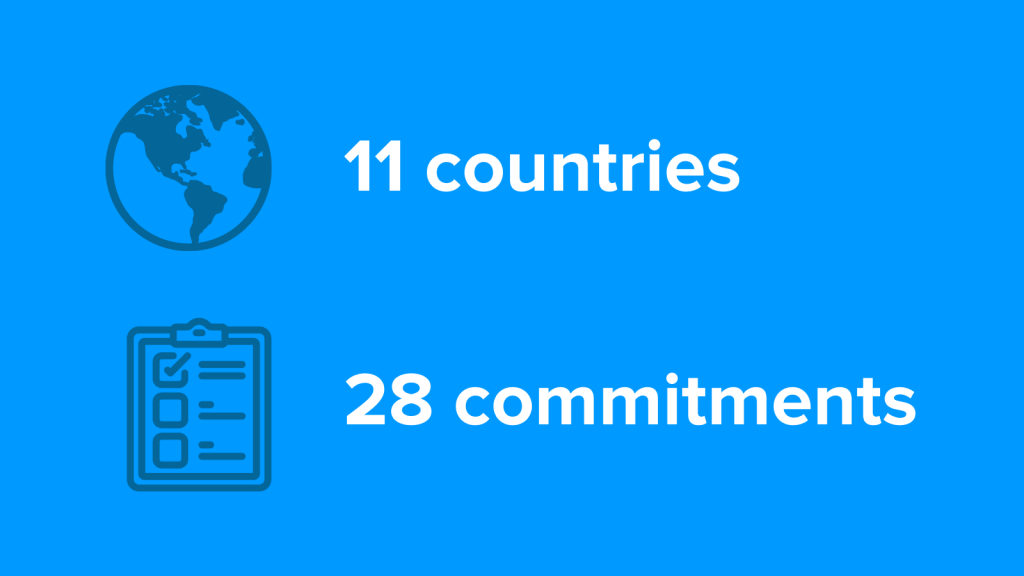
Justice
Investing in open and accessible justice systems allows citizens to better defend their rights, demand access to public services, and protect their ability to participate in democratic processes. Globally, over half of OGP countries with an active action plan are currently implementing a justice-related commitment.
Access to Justice
Accessible justice systems – both formal and informal – ensure that individuals and communities with legal needs know where to go for help, obtain the help they need, and move through a system that offers procedural, substantive, and expeditious justice. Seven countries included a commitment related to access to justice in their 2021 action plan. Factoring in last year’s action plans, one-third of OGP countries with an active action plan are currently implementing an access to justice commitment.
Open Justice
An open, independent, and impartial justice system serves as a foundation for better access to justice by fulfilling all people’s civil liberties and allowing individuals to more effectively protect their rights. Open justice commitments mostly involve publishing data from various actors within the justice system, including courts, prosecutors, police, prison systems, and legal aid providers. In 2021, five countries made commitments related to open justice.
Commitment Examples
- France’s Supreme Administrative Court is improving accessibility to administrative courts for citizens, particularly for people with disabilities.
- Senegal is creating legislation to provide citizens with administrative and judicial remedies to enforce their right to information.
- Sierra Leone is strengthening access to justice through both formal and informal mechanisms, while North Macedonia is improving access to justice for domestic violence survivors and expanding access to legal aid.
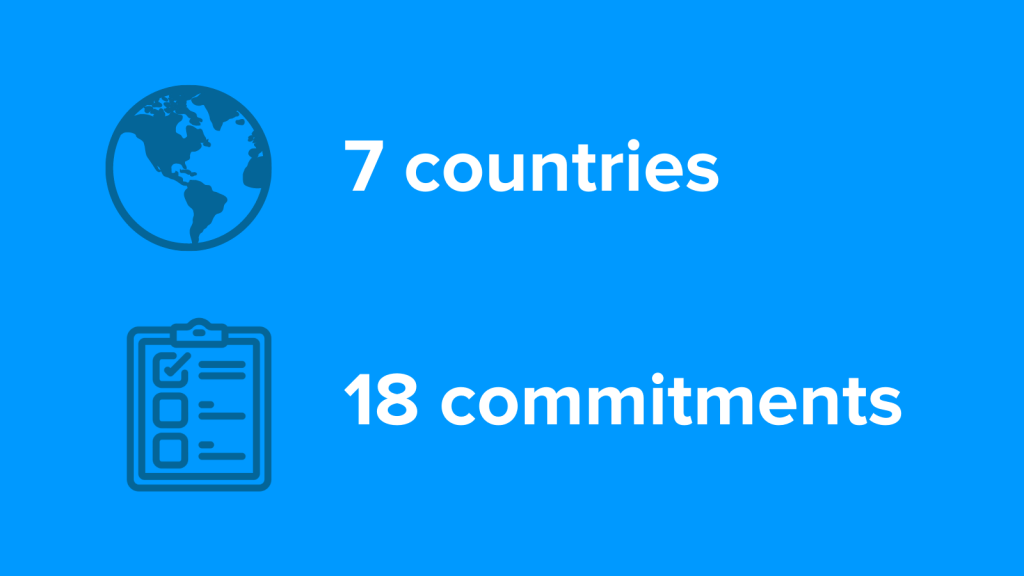
Open Parliaments
An open parliament – one that encourages transparency, participation, and accountability throughout the legislative process – is an essential part of an open government. Legislatures are leading implementation on 15 of the 18 open parliament commitments made in 2021 national action plans. This includes the Assembly of the Republic of North Macedonia’s open parliament plan co-created in parallel with the national action plan. Factoring in last year’s action plans, just over one-quarter of OGP countries with an active action plan are currently implementing an open parliament commitment.
Commitment Examples
- Ghana’s parliament is establishing an OGP caucus and developing an open parliament plan, while Sierra Leone’s parliament is increasing opportunities for civil society to participate in legislative activities.
- Uruguay’s parliament is publishing open data and strengthening citizen participation.
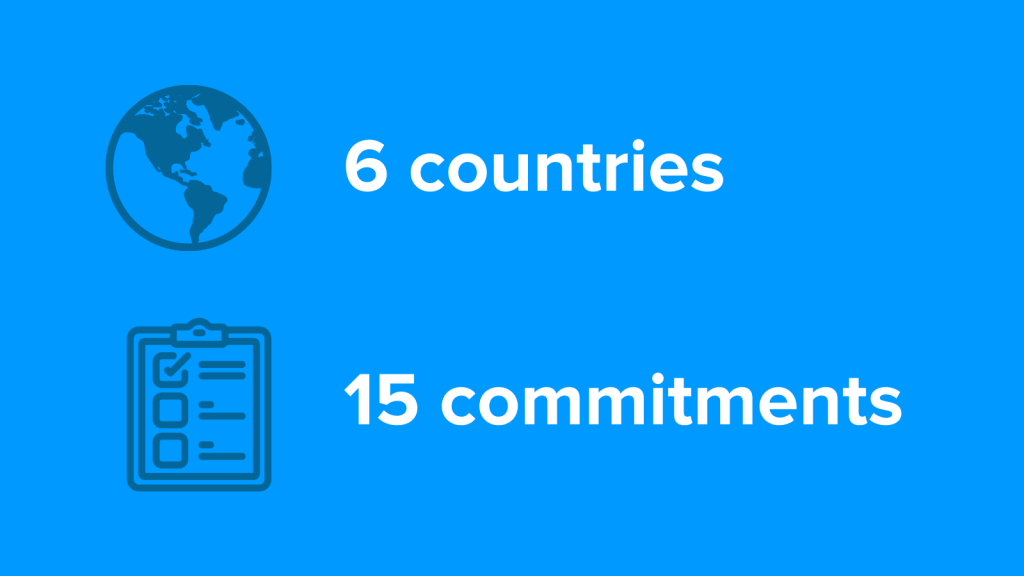
Digital Governance
OGP countries are leveraging the opportunities of evolving technology, such as artificial intelligence, data-driven algorithms, and mass social networks, while also developing policies to deal with the threats, including disinformation, discrimination, and privacy concerns. Globally, one-quarter of OGP countries with an active action plan are currently implementing a digital governance commitment. Most of these commitments are related to automated decision-making or data stewardship and privacy.
Commitment Examples
- France is engaging civil society and academia in dialogues on data protection and disinformation.
- Uruguay and France are making government algorithms available in a public register.
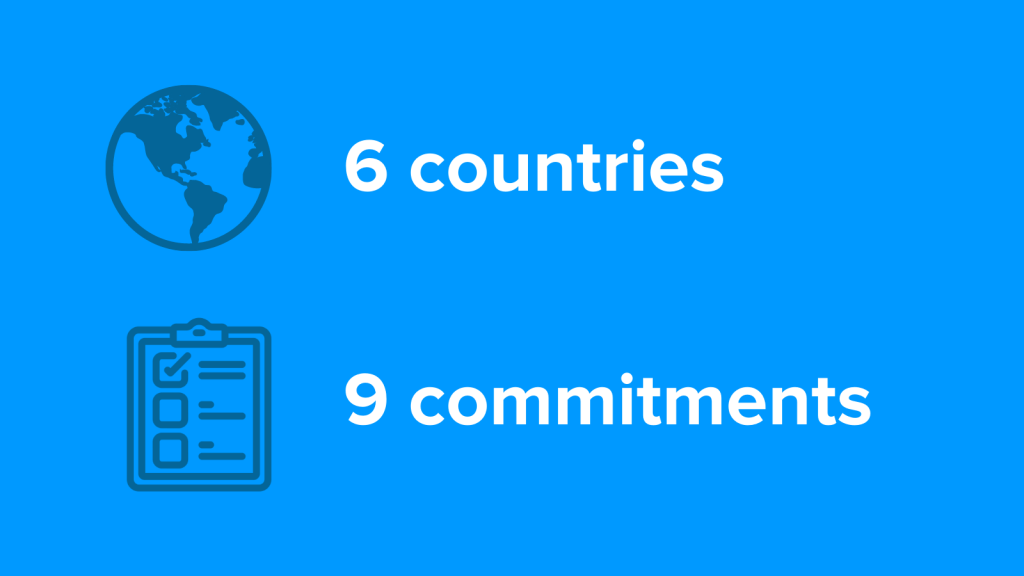
Civic Space
The freedoms of expression, association, and assembly allow citizens to actively engage with the government and hold decision-makers accountable. Most of the civic space commitments made in 2021 are related to the freedom of association. Factoring in last year’s action plans, just over one-quarter of OGP countries with an active action plan are currently implementing a civic space commitment.
Commitment Examples
- Mongolia is implementing a set of commitments to strengthen the legal bases of the freedoms of expression and association, while the Republic of Korea is working to support the sustainable growth and institutionalization of civil society.
- North Macedonia is publishing open data on civil society organizations through a central register to lessen registration burdens and connect government agencies to civil society partners.
Deliberation and Participation
Giving citizens opportunities to provide input into government decision-making leads to more effective governance, improved public service delivery, and more equitable outcomes. Through their OGP action plans, many countries have committed to creating and incorporating public participation mechanisms. Through their 2021 action plans, for example, Ireland and Senegal are strengthening guidelines and capacities for citizen participation in policymaking, while the Republic of Korea and Tunisia are improving online public participation platforms.
Open Data
By opening up data that is sharable and reusable, governments can enable informed debate, better decision-making, and the development of innovative new services. Across all policy areas and sectors, countries are publishing information according to open data principles. In addition to examples of open data activities referenced above, other 2021 commitments in this area include Brazil establishing a database on human rights violations, Ghana continuing their cross-ministry open data initiative, and Guatemala relaunching a national open data portal that includes datasets prioritized by civil society.
Subnational
Recognizing that much of what impacts people’s daily lives occurs at the local level, many OGP countries are working to open up lower levels of government by creating commitments focused on subnational government agencies. 2021 commitment examples include Latvia and Morocco improving opportunities for citizen participation at the local level, Ireland making local decision-making more inclusive, and Jordan implementing local community monitoring for government investment projects.
This analysis features data from 2021 national action plans and, where clearly stated, factors in active commitments from 2020 action plans. Commitment-level data can be found and downloaded on OGP’s Open Data page. Datasets are available in multiple formats under an open license. The Public Access Commitments Database is updated daily and includes all national commitments, their relevant policy area thematic tags, and their performance assessments from the IRM. This year, new commitment tags include digital inclusion, people with disabilities, youth, LGBTQIA+, and legislative oversight.
Access the full 2021 national action plans included in this analysis:
| Africa and the Middle East | Americas | Asia and the Pacific | Europe |
| Burkina Faso Ghana Jordan Morocco Senegal Sierra Leone Tunisia | Brazil Guatemala Jamaica Panama Uruguay | Mongolia Republic of Korea | France Germany Ireland Italy Latvia Lithuania North Macedonia Portugal United Kingdom |

